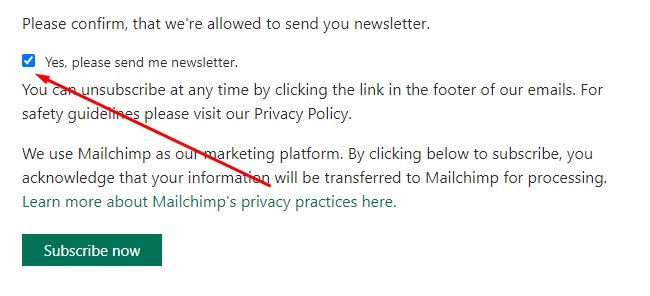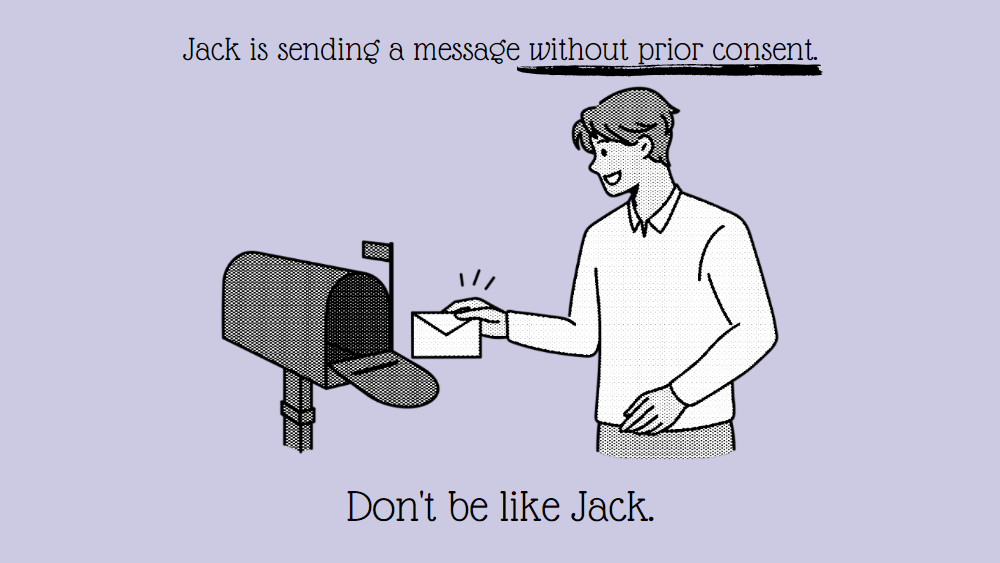Navigating the complex world of email marketing can often feel like walking a tightrope. You’re eager to connect with potential customers, but you might be wondering if you can send marketing emails without their consent.
This question isn’t just about adhering to legal guidelines; it’s also about building trust and maintaining a positive brand image. Imagine opening your inbox to find numerous unsolicited emails. It can feel invasive, right? Understanding the rules around consent can help you avoid becoming just another unwanted message.
We’ll unravel the mystery behind email marketing consent, helping you make informed decisions that respect your audience and boost your marketing success. Stay with us to learn how you can enhance your strategies without stepping on toes.
Legal Framework
Understanding the legal framework around email marketing is crucial. It ensures compliance and protects your business from penalties. Sending marketing emails without consent can lead to legal issues. Knowing the rules helps you operate within the law.
Data Protection Regulations
Data protection regulations exist to safeguard personal information. The GDPR is a key regulation in Europe. It requires businesses to obtain clear consent before sending emails. This rule applies to all personal data handling. Non-compliance can result in heavy fines.
In the US, the CCPA focuses on consumer privacy. It gives California residents control over their data. Businesses must provide an opt-out option for data sharing. Transparency in data usage is essential under these laws.
Email Marketing Laws
Email marketing laws vary by region. The CAN-SPAM Act is a primary law in the US. It mandates clear identification of promotional emails. It also requires a simple unsubscribe option. Violating this law can lead to severe penalties.
In Canada, the CASL governs email marketing practices. It demands express consent from recipients. Businesses must keep records of consent. Following these laws ensures ethical marketing practices.
Consequences Of Non-compliance
Sending marketing emails without consent can lead to serious legal issues. Businesses risk penalties and damaged reputations. Compliance with email marketing laws helps build trust and avoid fines.
Sending marketing emails without consent can seem like a tempting shortcut for businesses looking to expand their reach quickly. However, this approach can lead to severe consequences that could harm both your finances and reputation. Understanding these consequences is crucial for anyone involved in email marketing.
Fines And Penalties
Non-compliance with email marketing regulations can lead to hefty fines. For example, under the GDPR, companies can face fines up to 20 million euros or 4% of their annual global turnover, whichever is higher. Even smaller businesses can be hit hard, making it essential to follow the rules.
Beyond the immediate financial impact, legal proceedings can consume time and resources. Your business might spend months dealing with legal challenges. Wouldn’t it be better to invest that time in growing your business ethically?
Reputation Damage
Your brand’s reputation is invaluable, and sending unsolicited emails can tarnish it. Recipients who feel spammed may share their negative experiences online. This can lead to damaging reviews on social media and forums.
Furthermore, being labeled as a spammer can reduce trust in your brand. It’s challenging to regain credibility once it’s lost. Are you willing to risk your company’s good name for a short-term gain?
Consider the impact on customer relationships. Unsolicited emails can annoy and alienate potential customers. Building trust takes time, but it can be destroyed in an instant with one wrong move.
Incorporating consent into your email marketing strategy isn’t just about avoiding penalties. It’s about respecting your audience and building a sustainable business model. So, the next time you’re tempted to send an email without consent, think twice about the long-term consequences. Is it worth the risk?
Exceptions To Consent Requirement
Sending marketing emails often requires consent from recipients. Yet, there are specific scenarios where consent isn’t needed. Understanding these exceptions is vital for businesses aiming to communicate effectively without violating regulations.
Existing Customer Relationships
Businesses can email existing customers without explicit consent. Customers who have purchased goods or services fall under this category. The relationship implies a level of understanding and acceptance of communication. Emails should be relevant to the previous transaction or interest shown. This helps in maintaining trust and engagement.
Public Interest Communications
Emails sent for public interest purposes may not require consent. This includes messages about health, safety, or important public announcements. Such communications aim to benefit the community or society. They are generally accepted as necessary and valuable.

Credit: www.termsfeed.com
Best Practices For Obtaining Consent
Sending marketing emails without consent can lead to legal troubles and damage your reputation. Always seek clear permission before adding someone to your email list. Respect privacy laws to ensure compliance and maintain trust with your audience.
Obtaining consent for marketing emails is not just about following the law; it’s about building trust and fostering genuine relationships with your audience. By focusing on best practices, you can ensure that your email marketing campaigns are both ethical and effective. Let’s dive into some strategies that can help you gain the necessary consent while enhancing your brand’s reputation.
Opt-in Methods
Opting in is the gold standard for obtaining consent. Make it easy and clear for users to sign up for your emails. Consider using a simple checkbox during account registration or when users download a free resource.
Use a double opt-in process to confirm interest. This means after someone signs up, they receive a confirmation email to verify their subscription. It adds an extra layer of protection and ensures you’re reaching genuinely interested individuals.
Don’t forget to use engaging language. A compelling call-to-action (CTA) can make a significant difference. Instead of “Subscribe,” try “Join our community for exclusive updates!”
Transparency In Communication
Be upfront about what subscribers will receive. Clearly outline the type of content, frequency of emails, and any other pertinent details during the sign-up process. This sets expectations and reduces the likelihood of unsubscribes.
Provide a privacy policy link where subscribers can learn how their data will be used. This transparency builds trust and shows respect for their privacy.
Regularly update your subscribers about changes in your email strategy or data policies. Keeping them informed reinforces your commitment to transparency and respect.
Consider this: have you ever unsubscribed from an email list because the content was not what you expected? Avoid this pitfall by being clear from the start. Your subscribers will appreciate your honesty, and it will lead to a more engaged audience.
Alternatives To Consent-based Email Marketing
Marketing emails require consent to comply with regulations. But businesses can explore alternatives. These options ensure reaching audiences without violating privacy laws. They also help maintain trust and brand reputation.
Targeted Advertising
Targeted advertising focuses on showing ads to specific audiences. It uses data like browsing history and demographics. This method personalizes the user experience. Ads appear on websites or apps where users spend time. Businesses can reach people interested in their products. Targeted advertising is effective for acquiring new customers.
Social Media Engagement
Social media platforms offer great opportunities for engagement. Businesses can interact with users and build relationships. Sharing valuable content attracts potential customers. Users can comment, share, or like posts, increasing visibility. Engaging with users on social media creates brand awareness. It encourages organic growth and loyalty.
Case Studies
Sending marketing emails without consent can risk legal issues. Businesses must ensure compliance with privacy laws. Obtaining consent helps maintain trust and avoids penalties.
When navigating the waters of email marketing, understanding the importance of consent is crucial. Case studies provide invaluable insights into the successes and pitfalls that companies encounter. By learning from these real-world examples, you can make informed decisions about your own marketing strategies.
Successful Consent Campaigns
Several brands have turned consent into a powerful marketing tool. One notable example is a small e-commerce business that decided to revamp its email strategy. Instead of sending emails blindly, they launched a campaign asking their existing subscribers for explicit permission to continue receiving newsletters.
The result? Their open rates soared by 35%, and customer engagement skyrocketed. This approach not only complied with legal standards but also built trust with their audience. Wouldn’t you prefer a smaller, more engaged list over a vast sea of uninterested recipients?
Legal Actions Against Companies
On the flip side, failing to obtain consent can lead to serious consequences. A major retailer faced legal action for bombarding individuals with unsolicited emails. The case drew significant attention as the company was fined heavily and suffered reputational damage.
Consider this: the cost of compliance is often far less than the penalties of ignorance. This retailer’s experience serves as a cautionary tale—never underestimate the power of consent. Are you willing to risk your brand’s reputation for the sake of a quick email blast?
By examining these case studies, you gain practical insights into the real-world implications of email marketing without consent. It’s clear: the path to successful email marketing is paved with the stones of permission.
Future Trends In Email Marketing Regulations
Navigating future email marketing regulations is vital. Sending marketing emails without consent may breach privacy laws. Stricter rules are expected, focusing on user consent and data protection to enhance trust.
Future trends in email marketing regulations are reshaping how businesses communicate. Compliance is becoming crucial for marketers. As privacy concerns grow, laws evolve to protect consumers. Understanding these changes ensures ethical email practices.
Evolving Privacy Laws
Privacy laws are changing globally. The General Data Protection Regulation (GDPR) set a high standard. Other regions are creating similar laws. Businesses need to adapt quickly. Consent is a key focus. Marketers must gain explicit permission before sending emails. This approach builds trust with consumers. Non-compliance can lead to penalties. Staying updated on privacy laws is essential for marketers.
Impact Of Consumer Awareness
Consumers are more aware of their digital rights. They understand how data is used. This awareness influences email marketing strategies. People demand transparency from brands. They expect respect for their privacy. Marketers must prioritize consumer consent. Providing clear choices helps maintain trust. Ethical practices attract loyal customers. Adapting to consumer expectations is crucial for success.

Credit: www.litmus.com
Frequently Asked Questions
Is It Legal To Send Marketing Emails Without Permission?
Sending marketing emails without permission is illegal in many regions. Laws like the CAN-SPAM Act require consent. Always obtain permission to avoid fines and ensure compliance. Following regulations protects your brand reputation and maintains trust with recipients. Prioritize legal practices in email marketing strategies.
Can You Send Emails Without Consent?
Sending emails without consent is generally illegal and violates privacy laws. Always obtain permission before emailing.
Are You Allowed To Send Marketing Emails?
Yes, you can send marketing emails, but comply with legal requirements. Obtain consent, provide opt-out options, and follow GDPR or CAN-SPAM laws. Ensure your emails are relevant and valuable to recipients to enhance engagement.
Do Marketing Emails Need To Be Hipaa Compliant?
Marketing emails need HIPAA compliance if they contain protected health information. Ensure secure handling and avoid sharing sensitive details. Use encryption and proper authorization to safeguard patient data in marketing communications. Always consult with legal experts to maintain compliance and protect your organization from potential penalties.
Conclusion
Respecting email consent is crucial for your marketing success. Sending emails without permission can harm your brand. Trust is built through transparency and respect. Always seek consent before contacting potential customers. This approach not only complies with laws but nurtures goodwill.
Remember, a respectful relationship leads to better engagement. People respond better to honest communication. Consent ensures your message is welcomed, not ignored. Focus on building trust and credibility. These are key to a successful email marketing strategy. Prioritize consent, and your audience will appreciate your respect.
This leads to lasting connections and positive results.

